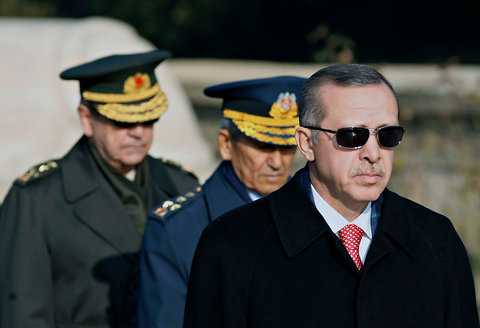A Game of Turkey
By ANDREW FINKEL

Prime Minister Tayyip Erdogan of Turkey, right, with military leaders at a ceremony in Ankara on Dec. 15.Burhan Ozbilici/Associated PressPrime Minister Tayyip Erdogan of Turkey, right, with military leaders at a ceremony in Ankara on Dec. 15.
ISTANBUL — The Turkish military has long regarded it as part of its job description to guard against the governments it serves. There have been three coups in Turkey since the end of World War II. And though the last one occurred more than 30 years ago, the armed forces have not surrendered their prerogative to call politicians to heel.
So it really was a case of man-bites-dog to watch Ilker Basbug, a former chief of the army’s general staff, be hauled before a court and bundled off to jail last week on charges that he belongs to Ergenekon, an ultranationalist, terrorist organization bent on overthrowing the government. Almost as topsy-turvy is the news that the 94-year-old former president Kenan Evren was indicted on Tuesday for seizing power from a civilian government in 1980. He faces life imprisonment.
Basbug joins a growing battalion of 139 suspects in what has become known as the Ergenekon trial. The prosecutor claims that he participated in a conspiracy to take power from the ruling Justice and Development (AK) Party. Specifically, he is alleged to have presided over an attempt to flood the Internet with rumors that would have undermined the government. At the very least, Basbug is guilty of believing his own propaganda that the Turkish military has a privileged place in the country’s political life.
Many pro-government columnists are celebrating these arrests as the beginning of the end of the Turkish military’s tutelary state. Yet it is far too soon to cheer. Though the government is right to remove the military’s hand from the tiller, it has been far too slow in dismantling the apparatus that the generals created; Turkey’s civilian leaders should also be reforming the system. Only this week, the prosecutor in the Ergenekon trial accused Kemal Kilicdaroglu, the leader of the opposition, of interfering with justice simply for saying that the prosecutions were politically motivated. Until such meddling with basic freedom of expression stops, Turkish democracy will have to sleep with one eye open.
Part of the problem lies with the 1982 Constitution. Penned while Turkey was under martial law, it endowed key positions within the judiciary and the bureaucracy with enormous and arbitrary authority. Its authors did not expect that those powers would one day fall into the hands of their ideological foes.
Their key nemesis has been Prime Minister Tayyip Erdogan, who came to power in 2002 determined to fight the secular old guard by appealing to a religious and socially conservative base. In 2007, when Parliament seemed poised to select as president a man whose wife wore an Islamic headscarf, the military issued veiled threats on its official Web site. Like Dr. Frankenstein, the generals’ hearts sank to learn that their creation had got the wrong brain.
The AK Party won a handsome victory last year pledging to liberalize the 1982 Constitution. Given Turkey’s highly polarized system, this looks like a difficult promise to fulfill. An even greater obstacle may be that, having gradually conquered the bastions of the old establishment, the AK Party is now reluctant to press for reforms that could limit its own authority. It is experiencing a Frodo Baggins moment: It knows it should throw the ring of power into the fire, but the ring feels increasingly comfortable on its finger.
Yet with the generals gradually being tamed, the politicians must learn to accept responsibility when things go wrong. Faulty intelligence was responsible for the sickening air assault that claimed the lives of 35 smugglers near the Iraqi border last month: they had been mistaken for Kurdish militants. But the government has yet to offer an apology.
Andrew Finkel has been a foreign correspondent in Istanbul for over 20 years, as well as a columnist for Turkish-language newspapers. His latest book, “Turkey: What Everyone Needs to Know,” will be published this year.
via Turkey’s Government Should Push for More Reform After Curbing Military’s Power – NYTimes.com.